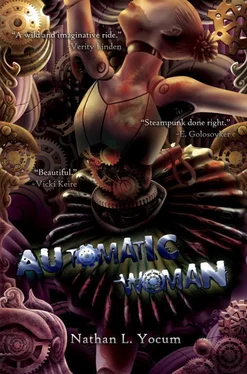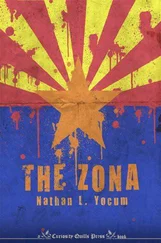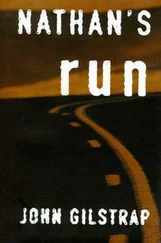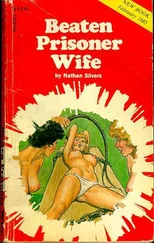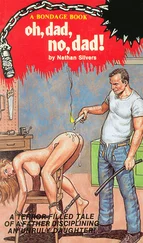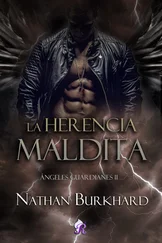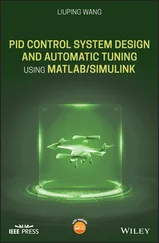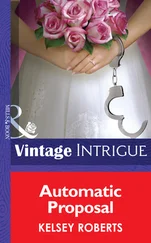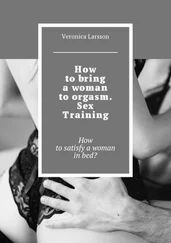“Have you noticed?” Mary asked.
“Noticed what?”
“The light in the windows. It’s funny.”
She was right. A sun beam shone through and revealed that the base of the frame was of an unusual size. It was thick, like a block of ice instead of a window. The glass itself must have been twelve centimeters thick set in a custom frame of similar proportions. I touched the glass. It was warm and little rainbows set in the refracted light between the outside and inside. Something struck the glass, hard and sudden like the sting of a hornet. I fell back in surprise. A bullet had lodged itself in the thick glass, head-level to where I’d been standing. Two more rounds struck the glass; thwack thwack , and then the entire block imploded and covered the living room with thick shards of glass.
“Get down!” I yelled. It was unnecessary. Mary’s survival instincts were formidable and she’d taken up behind the iron stove at the first bullet’s impact. I rolled away from the window, cutting my right hand on a shard on the process. A couch cushion exploded, then a bottle of whiskey. Every exploding object was followed by the popping rifle report, somewhere off in the wilderness. I slid up against the cabin wall, the living room table splintered and ruptured into two pieces. The frying pan jumped off the stove and twisted in the air. Someone was screaming, though I couldn’t tell if it was Mary or me. I looked around the room for a weapon, an item I could clutch and wield and feel just a little less vulnerable and endangered.
I tore my shirt and wrapped a strip of cloth over my wounded hand. It was the same hand I had cut on the drain pipe two weeks prior. The fresh wound criss-crossed my mostly healed scar, leaving a deep “x” across my palm, something for the gypsy readers to ponder later.
It took a moment for me to realize that whoever was shooting had stopped firing into the living room. The forest was still alive with the pops of gunfire, but now it came from everywhere. In front of the cabin, behind it, echoing through the trees and hills and giving confusion to all the small creatures who were yet to grow accustomed to mechanized murder.
I grabbed a dagger-sized bit of glass in my wrapped hand. I dared not look out the window, but the front door was less than a meter from my hiding spot. The shattered window was a meter in the other direction. Anyone coming in was coming in right on top of me, and I fully intended to get on top of them.
A familiar voice cried out in pain in front of the door. Stevens. I felt no alliance with the bastard but his cries were shrill and animalistic and the compassionate side of me took over. I opened the door a sliver. Stevens was laid out on the ground. The shooter had done for him but good. Stevens’ left leg ended in a bloody stump trailing squid tentacles of flesh and tendons. His foot was two meters up the path, upright and standing still, as though waiting for its owner to reclaim it and walk away. Stevens was crawling to my door all hands and elbows. He gripped a fistful of sod, pulled himself a few centimeters, dug the butt of his rifle into the dirt, pulled himself a few more centimeters and so on. The dirt exploded near his head. Stevens rolled onto his back and fired a blind shot into the wilderness. Another round lodged into a nearby tree, raining bark and splinters over the downed man.
I threw the door open and ran to Stevens, not giving thought to myself being the popular target. The forest came alive with gunfire. I seized the back of Stevens’ jacket collar and dragged him the remaining distance to the cabin, all the while him firing covering shots into the forest.
Mary was already at the door when we reentered. She removed her belt and applied it as a tourniquet to Stevens’ leg. He jerked and screamed and blood pooled up under him pretty fast. I was amazed at Mary’s pragmatism. No squeamishness in that one.
The living room once again was assaulted with rifle shots. I shouldered Stevens’ firearm, pulled back the bolt, and moved to the very edge of the window. A quick peek showed two targets running for the cabin from flanking positions. One wore an ape mask, the other an elephant. Of course.
“Stevens, how many rounds are in your rifle?” I called out. His first response was a scream. Mary put her foot on his leg and pulled her belt tourniquet with all her strength but his leg still bled freely.
“Bullets, goddamn it! How many?!”
“I don’t know!”
Shite!
“Do you have any on you?”
“No, ah!” Mary gave his tourniquet another good yank.
I peeked again. The maskers were closing the distance in long quick strides. Each had a mean-looking long rifle, something meant for range and punch if Stevens’ missing foot was any indicator. I closed my eyes, took a deep breath, and counted to three. I thought about my dad, about Mary, about Barnes, and Darwin, and even the Swan. One minute your life is hell, the next it’s heaven, then back to hell again with no breathing room in between. I opened my eyes, gave a bellowing war cry, and stepped into the line of fire.
Things slowed down as they often do in moments of extremity. I saw the maskers at fifteen meters, equidistant from each other and myself, like some mystic triangle. I fired a round at ape mask, missed, drew back the bolt, locked it, and fired again.
The second shot missed. The rifle’s magazine strip popped, and I knew I was out of the shooting business. Ape and Elephant opened up. A round tugged my jacket. I fell to my knees, tasting blood and knowing that my moment had come. I would die a man of action, and even if it were on my knees, I would have firearm in hand, boots on my feet and a curse on my lips.
“Come take your licks you right bastards!” I screamed at the approaching maskers. They’d seen my magazine pop, my rifle become a relic, a thing more of weight than value. Elephant lifted his mask. It was Myron Bell, of course.
“I’m sorry, Jolly. It’s just business.”
He raised his rifle up and suddenly Hannosh was behind him, cloaked in leaves and armed with nothing but a curved knife. Hannosh ran his blade over Bell’s neck. The curved blade didn’t just cut Bell’s throat, it ruptured his neck like a sack of blood.
Ape swung his rifle to the new target, but was stopped when Hannosh flicked his wrist. The curved blade embedded itself in far off tree. Ape’s rifle dropped to the earth. His right hand still clutched the trigger guard, though Ape was no longer in possession of rifle or hand.
Ape wailed and waved his stump, a man consumed by panic. Hannosh punched Ape hard enough to break his mask and knock the poor sod out. It was Edgar Smithly, formerly of Bow Street, formerly an esteemed colleague. Hannosh put a hand on my chest.“Help me get them to the carriage,” he said. His accent was thick, but he spoke slowly and clearly. We lifted Edgar and loaded him into the boot of the carriage. Afterward, we carried Stevens to the passenger compartment. He had wrapped the end of Mary’s belt around his right hand.
Mary and I made to climb in with Stevens but Hannosh stepped in front of the door.
“Stay here. Stay inside.”
I wanted to argue, to tell him that his man might bleed to death without an attendant, but after seeing him dispatch the maskers the way he did, the man struck fear in me. There was no shame in admitting he was a genuine killer. I held Mary back and Hannosh took off in the carriage.
Mary and I returned to the cabin. A quiet breeze entered through the hole in the window. The trees swayed and the wisping of their leaves became the dominant sound. Mary picked through the shattered tins and crates. She came across an intact bottle of American Bourbon. Her hands shook as she poured a glass, drank it down, then another, and another. When half the bottle was gone she looked up to me.
Читать дальше
